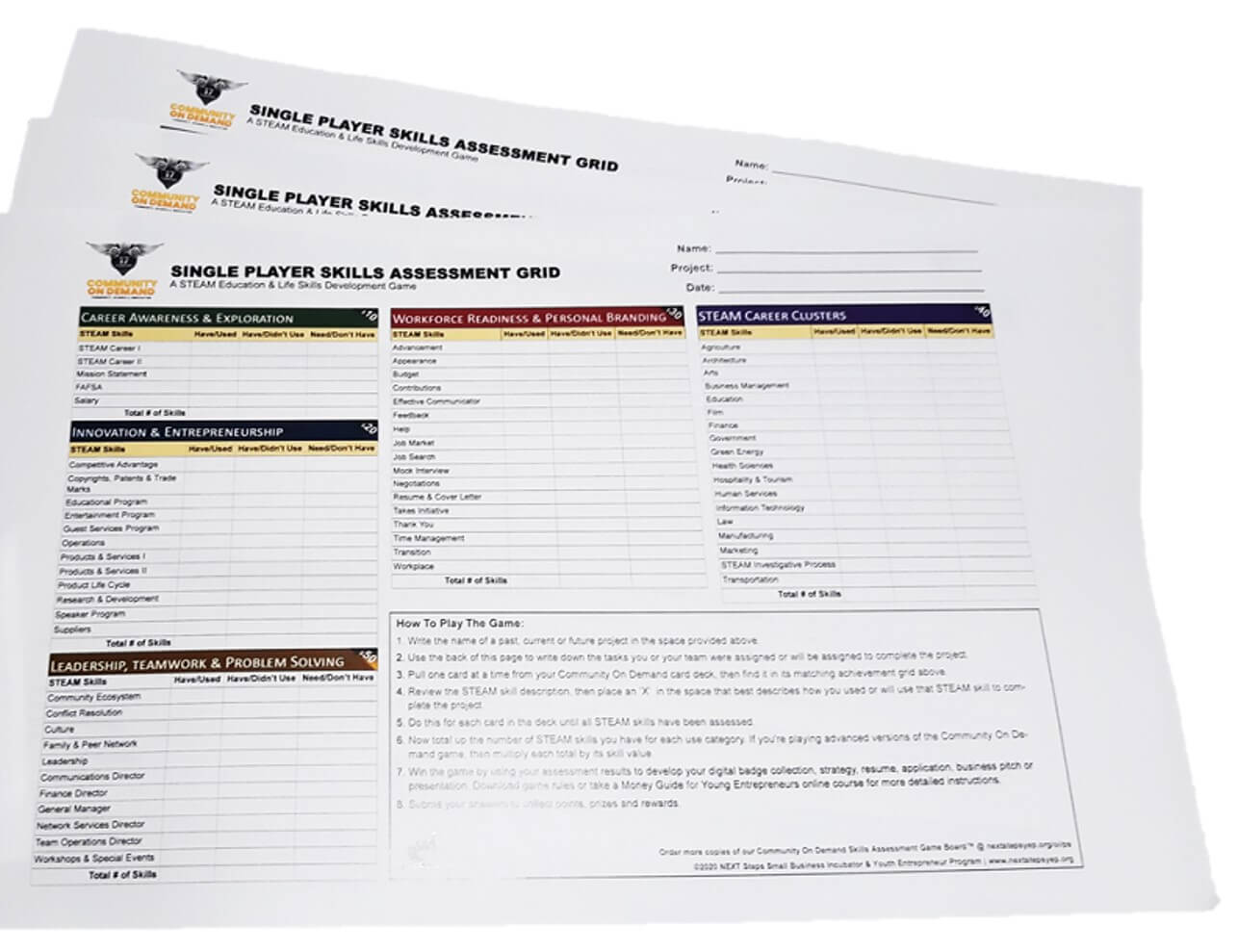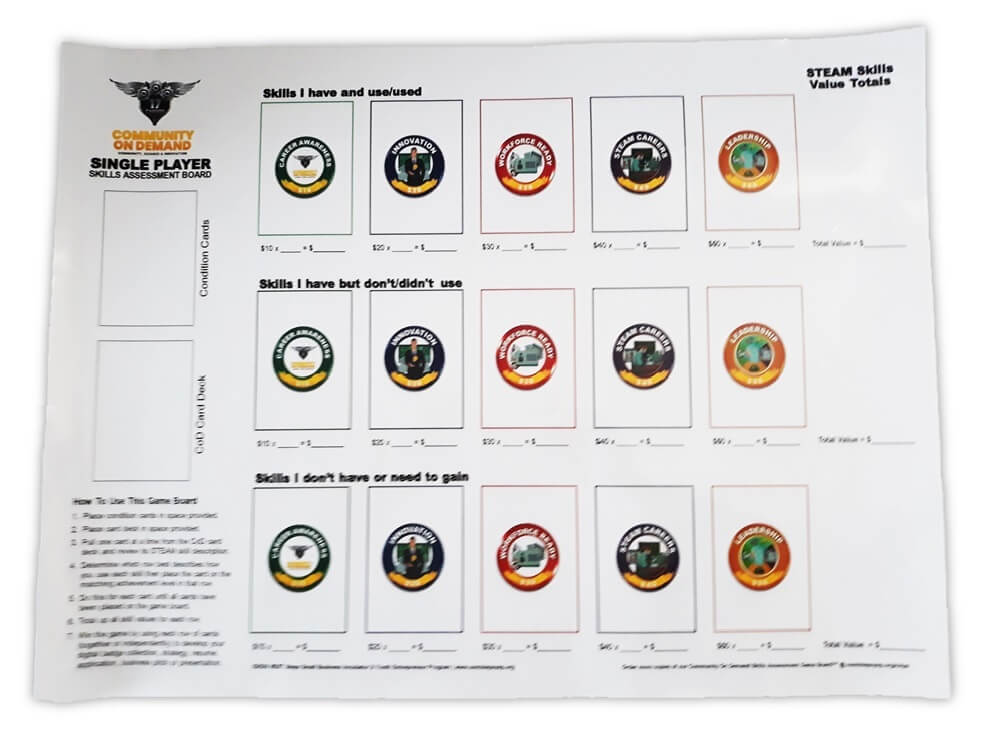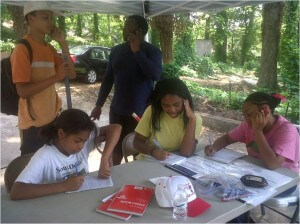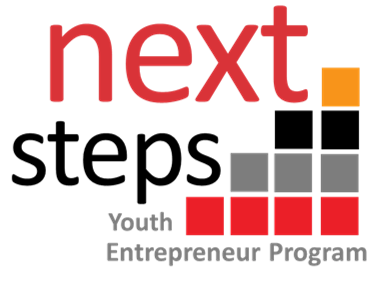Table of Contents
About Us
Who We Are
The NEXT Steps Small Business Incubator is a Georgia based for profit company established in 2012. We created Community On Demand™ to provide sustainable business, curriculum and leadership development products and services to support purpose-built strategies for educators, businesses and community groups.
Our Mission
Use our flexible, blended-learning employment solutions for business, curriculum and leadership development to create an employable workforce that is skilled in addressing, reducing and eliminating the socio-economic conditions that are negatively impacting their local communities.


Business
Development
We use the Community On Demand™ card game curriculum to conduct a SWOT Analysis and illustrate the shared design of collective impact

Curriculum
Development
Community On Demand™ provides an infrastructure for curated digital content, training and enhanced work-based learning experiences

Leadership Development
We develop Community On Demand™ anchor teams to connect the missions of our partner organizations and advocates to one another
Request A Consultation

What Is Community On Demand™?
It's Life Skills A Curriculum A Resume A Business Plan Career Mapping Professional Development Economic Development Strategic Planning Leadership Coaching In A Box
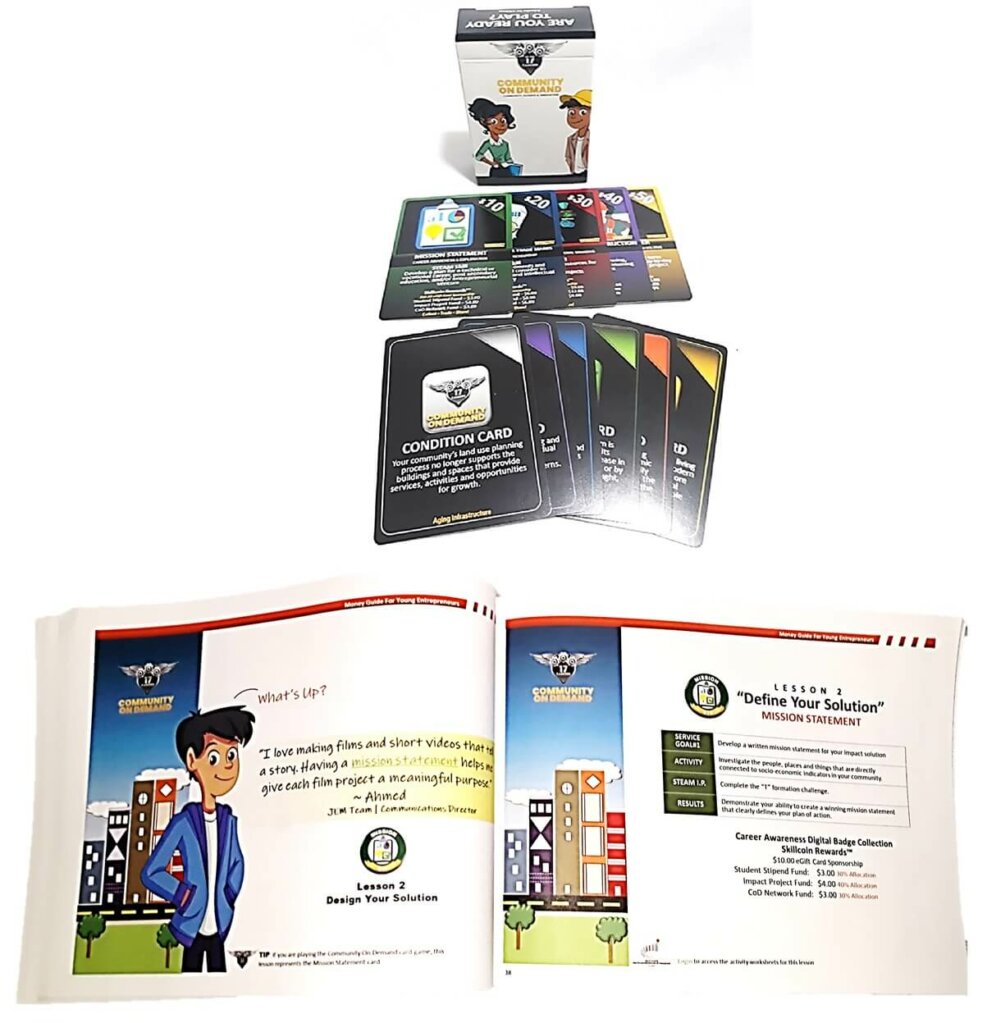
Community On Demand™ is an innovative, game-based learning management system that uses the fun of a card game to help learners (at any age) define, measure, build and name up to 63 of their high-demand employability (STEAM/soft) skills.
Employability skills are the core skills and traits that gives us value and makes us desirable to organizations, employers, colleges, hiring managers and teams.
The Community On Demand™ LRNG Logic Model Game Set & Textbook
The Community On Demand™ Card Deck is an innovative 72pc pocket-size, card game curriculum that uses five color-coded achievement domains to help learners quickly define, measure, build and name up to 63 of their high-demand employability skills.
It’s “business-in-a-box” game play meets Course Standard #1 of all Career & Technical Education (CTE) curricula (See Carl D. Perkins V Act), helps learners quickly self-assess their high-demand employability skills, and ensures learners are engaged in college & career readiness activities.
Achievement Domains:
- Career Awareness & Exploration – Visualizes the career mapping/readiness conversation as learners prepare to enter college and/or the workforce
- Innovation & Entrepreneurship – Teaches economic & business development skills
- Workforce Readiness & Personal Branding – Teaches project management and job readiness skills
- STEAM Career Clusters – Introduced STEAM career clusters (industries) and career-building opportunities (pathways)
- Leadership, Team-building & Problem Solving – Rewards development and implementation of creative solutions and effective leadership
The Community On Demand™ Skills Self-Assessment Game Board is a reusable 18″ x 24″ dry-erase project-based mapping tool. The game board makes team-building fun as it helps learners visually assess the employability skills they have, need and use to successfully complete any project. By matching each skill card with its color-coded space on the board (based on use), learners will quickly visualize their contribution and efforts.
Advanced use of the Community On Demand™ game board introduces learners to financial literacy, team building, social students, economics and entrepreneurship as they are able to calculate the contribution value of their employability skills.
The game board comes with game instructions and a think tank doodle space on the back to give learners extra room for mapping out their thoughts. Single and team game play can be completed in one hour or less!
The Money Guide for Young Entrepreneurs Activity Workbook & Online Courses provides fun, interactive lessons and activity worksheets to teach learners of all ages how to:
- Create and implement an impact solution
- Demonstrate the value of their STEAM skills
- Build a team
- Promote and brand their achievements AND
- Develop a business or career-building opportunity that benefits themselves, their families, their team and their community
By completing The Money Guide for Young Entrepreneurs, learners will be able to:
- Create a digital portfolio, financial portfolio and business plan
- Demonstrate their ability to promote, brand and monetize their knowledge, special abilities, interests, STEAM skills and achievements
- Create sustainable impact solutions that benefit their communities and convert them into career-building opportunities and social enterprises.
Purchase A Community On Demand™ Game Set
Get a complete game set for a young learner that includes a Community On Demand™ card deck, 3 skills assessment worksheets, and a game board.
How It Works
The Community On Demand™ LRNG Logic Model
We were inspired by The LRNG logic model created by The Urban Institute. It provides a foundation for operational and performance measurement planning and evaluation planning for anchor organizations and serves as a communication tool for explaining the initiative to a wide range of audiences.
Columbia Climate School defines Anchor institutions as “universities, hospitals and other enduring organizations that play a vital role in their local communities and economies. They tend to remain in their geographical settings, even as conditions change around them. Therefore, they are vital assets to their neighborhoods, towns, cities and regions. Increasingly, anchor institutions are expected to do more in their communities, and become active civic participants in improving health and well-being in their surroundings.”
At The Heart
So when we looked at the Cities of LRNG initiatives of 2015, we understood how their goal was to maximize Connected Learning by fostering robust local learning ecosystems that support youth academic and career preparation. At its heart was partnerships: connecting informal learning actors—for example, community-based organizations, libraries, museums, and makerspaces—with schools, city leaders, employers, and postsecondary institutions. Each participating city had an anchor organization or group of organizations that were hubs for connecting local institutions to each other and to the national LRNG initiative.
To articulate the goals and activities of Cities of LRNG, The Urban Institute developed a logic model in partnership with staff and leaders from the John D. and Catherine T. MacArthur Foundation and the 2015 cities.
How Community On Demand™ Works
The Community On Demand™ LRNG Logic Model illustrates the operational plan, activities, and expected outputs of our game-based learning management system for youth, anchor organizations, local partner organizations, and employers and postsecondary institutions. It also depicts short-, intermediate-, and long-term outcomes in three domains:
- Youth Learning (social development),
- Youth Opportunities (educational and career advancement), and
- Our Learning Ecosystem (system-level changes to ecosystem actors, practices, and policies).
Learn More About
Our Learning Management System
Attend an orientation webinar to learn more about creating a Community On Demand™ implementation strategy for your organization
Do Better. Think BIGGER!
Knowledge Is Power
Those who know how, will always have a job.
Those who know why, will always be their boss.
Those who know what to do, determine the outcome.
What Is Game-Based Learning?
Global Game-Based Learning Market Drivers
The global game-based learning market reached a value of US$ 5.8 Billion in 2020. Game-based learning aims to motivate students and capture their interest by using video game design and elements in learning environments. Using this method helps in simplifying complex topics and provides an interesting and entertaining pathway for learning. Moreover, it gives ownership of learning to the students, inspires them to switch to a lateral thinking approach, offers them opportunities to study different fields and makes the learning process more viable. As a result, game-based learning is one of the fastest growing trends in the education sector across the globe.
The rising demand for quality education with a modern and interactive approach has resulted in an increase in the adoption of game-based learning techniques by several educational institutions. In addition, the introduction of tablet and e-learning methodologies in schools across the globe has created a positive outlook for the global game-based learning market. Apart from this, an increase in the usage of Augmented Reality (AR) and Virtual Reality (VR) in educational gamification has helped in providing a more immersive and interactive experience. The other factors influencing the growth of the market include the rapid emergence of social media, rising income levels, increasing penetration of smart phones, rising access to high speed internet, etc. Looking forward, IMARC Group expects the global game-based learning market to exhibit strong growth during the next five years.
Market Analysis
- Based on the platform, the market has been segmented into online and offline.
- Based on the revenue type, the market has been segmented into game purchase, advertising and others.
- Based on the end-user, the market has been segmented into K-12 game-based learning, higher game-based learning. The K-12 game-based learning segment currently represent the biggest segment.
- Region-wise, the market has been segmented into North America, Europe, Asia Pacific, Middle East and Africa, and Latin America.
- The competitive landscape of the market has also been examined with some of the key players being Badgeville, Bunchball, Classcraft Studios, GoGo Labs, 6waves, Recurrence, Fundamentor, Gametize, GradeCraft, Kuato Studios, BreakAway Games, Filament Games, LearningWare, Playgen, Tangible Play and Toolwire.
Who Are The Buyers?
There are eight Game-based Learning buying segments analyzed in this report:
- Consumers,
- Three academic sub-segments (preschools, primary schools, and secondary schools),
- Tertiary & higher education institutions,
- Federal government agencies,
- Provincial/state/prefecture & local government agencies, and
- Corporations & businesses.
Metaari’s 2019-2024 Global Game-based Learning Market report breaks out the global revenues for each of these segments and provides a detailed breakout by these segments for the US.
GBL Impact
Game-based learning (GBL) aims to motivate students and capture their interest by using video game design and elements in learning environments
Grades
Leadership Development GBL
A Universal Approach
Game-based learning (GBL) as a universal approach to developing leadership skills have been winning attention from researchers and practitioners. There are numerous studies which support the positive effects of games on learning and knowledge development; however, more research is needed regarding how games may influence development of leadership skills.
“Leadership Styles and Skills Developed Through Game-based Learning” examines recent literature regarding game-based learning influence in leadership skills development and if new leadership styles can emerge during a collaborative gaming process. The research questions were: 1) What were the leadership skills developed, during a GBL course? Moreover, 2) What kind of leadership styles emerge in the gaming context?
The methodological approach was quantitative and also qualitative, privileging the interpretative approach and the primary technique used was content analysis from the forums of discussion of 8 GBL courses with 15 participants in each course summing a total of 120 individuals and also factor analysis based on data collected by a questionnaire about the leadership skills developed, and which conducted to the identification of the leadership styles.
The findings suggest that a game-based learning approach is an effective approach to leadership skills development and the primary skills developed were: motivation, facilitation, coaching, mindset changing, and communication. The significant originality of the research was the analogy process between the games situations and the organizational life resulting on the creation of a leadership typology.
Market Test Results
"Game-based learning was an effective approach to developing leadership skills as well as motivation, facilitation, coaching, mindset changing, and communication."
Business Development GBL
Game-Based Learning's Corporate Impact
The corporate segment has the highest growth rate for learning games at a breathtaking 47.5%. There are two catalysts driving the growth in the corporate segment: the rapid uptake of psychometric job candidate evaluation games and the continued adoption of business simulation games. Revenues will more than double in all eight global buying segments over the forecast period and will surge more than six times in the corporate buying segment. Yet the market drivers are unique to each segment. For example, the corporate demand is being driven by the booming demand for pre-employment assessment and evaluation games; the corporate segment has the highest growth rate out of all eight segments at a breathtaking 47.5%.
By 2024, the consumer Game-based Learning market will essentially be a commodity market; volume sales and revenues will be very high but unit prices will decline. In a commodity market, suppliers tend to compete on price. That said, the demand in the consumer segments across the globe is very high and the revenues for Game-based Learning will be heavily concentrated in the consumer segment throughout the forecast period.
Projected Growth Rates
The growth rate for serious games in the higher education and tertiary segment is a healthy 15.4%.
Tools
GAMES
Curriculum Development GBL
The Impact on PreK-12, Primary & Secondary Markets
The PreK Segment
The PreK-12 segments are broken out by the three sub-segments because the buying behavior and the user demographics are quite different in each cohort. The demand is being driven by data showing that games in preschool can accelerate the transfer of both developmental abilities and basic academic skills.
Games have been proven to be quite effective at teaching young children social and emotion learning (SEL) skills. The large for-profit preschool chains (particularly in the US and China) are the top buyers of educational games for preschoolers. They license games from commercial Game-based Learning companies.
The revenues for Game-based Learning will spike over five times in four of the eight buying segments over the forecast period. For More Information, eMail: research@metaari.com
Primary & Secondary Markets
The types of games used in the primary and secondary sub-segments are very different as they map to scaffolding curricula. For example, STEM games are more common in middle school and high school programs. Several recent trends could greatly accelerate the adoption (and the revenues) of serious games in the academic segments. Perhaps the most significant catalyst is Microsoft’s entry in the serious games industry when they launched their Minecraft: Education Edition in November 2016. In just one year, they had over two million licensed users across the planet. Microsoft continues to add resource packs (coding and chemistry are the latest) making the platform more attractive to the academic segments. By June 2019, they had over 40 million teacher licenses across 115 countries.
There are other major trends impacting the uptake of Game-based Learning in the global PreK-12 sub-segment:
- One of the most successful Game-based Learning suppliers in the PreK-12 segments across the planet is Norway’s Kahoot!. In January 2019, they reported that they had surpassed 90 million users. They claim their game is being played by more than half of all US-based PreK-12 students (45 million students). Kahoot! claims to be the fastest growing learning brand in the world with a 75% year-overyear growth rate.
- In June 2018, Roblox launched their Roblox Education program, which is a Game-based Learning platform. The bundle is free for educational institutions and includes lesson plans. “The curriculum is available now and includes everything educators need to teach kids, ages 10 and up, technical and entrepreneurial skills on Roblox, such as step-by-step tutorials, handouts, lesson guides, and more. Roblox’s roots have always been steeped in STEM education.” Roblox had over 90 million active users by June 2019. In June 2019, they reported that they had ” reached more than 650,000 students worldwide through its education initiatives in 2018, and it expects to more than double that number in 2019.”
- Ubisoft’s Assassin’s Creed is one of the most popular games in the gaming industry. Their Assassin’s Creed Origins game was released in late 2017 and sold over 1.5 million copies in the first week. In February 2018, Ubisoft launched their new (non-violent) Discovery Tour by Assassin’s Creed: Ancient Egypt game that is “a new educational and entertaining tool which lets anyone explore the The granular
breakouts of the PreK-12 segment by the three subsegments provide visibility into the demographics and revenue opportunities in specific grade brackets. ” The game is a unique experience at the intersection of entertainment and learning. As both a game and a learning tool, it is quite a unique asset for teachers to integrate as part of their history classes.” According to Ubisoft, “Discovery Tour by Assassin’s Creed: Ancient Egypt” is a completely new type of edutainment tool.
Custom Content Development
The growth rate for custom content development services is quite high at 47.5% and revenues will spike over seven times over the forecast period. There is a vibrant (and growing) cottage industry of custom Game-based Learning developers across the planet. The major buyers of custom services are corporations and government agencies although tertiary institutions (particularly business schools) also hire developers to create custom learning games. Corporate-facing custom developers tend to specialize in specific industry verticals. Government facing developers tend to be very specialized. The growth rate for Game-based Learning authoring tools and platforms is a robust 39.3%. Revenues will surge over five times over the forecast period. Dedicated Game-based Learning tools are relatively new on the market but new specialized rapid authoring tools continue to come on the market at a rapid pace. This report identifies over 70 new Game-based Learning tool companies.
Authoring Tools
Suppliers are bringing authoring tools to the market designed for specific demographics, buying segments, and verticals. For example, tools designed to create educational games for museums and tourist venues are specialized for those verticals. Specialized tools are also available now for preemployment assessment and evaluation games used in the organizational segments. There are highly-specialized authoring tools designed to create games for children. And of course, the tools used to author AR, VR, and AI-based learning games are quite unique and very new on the market. There are at least twelve specialized types of learning game authoring tools and they are identified in this report. The five-year compound annual growth rate for packaged retail games is 31.7%. Revenues for packaged retail educational games (for all eleven types combined) will nearly quadruple over the forecast period. The vast majority of revenues for Game-based Learning will be derived from packaged games throughout the forecast period.
Educational Game Framework
The educational game framework provides suppliers with a precise method of tapping specific revenue streams and a concise instructional design specification for the development of pedagogically-sound and profitable educational games.
Are You Ready To Play?
Join the growing list of educators, community leaders, executives and business owners that are using Community On Demand™ Play Dates as an innovative game-based learning session for curriculum, business and leadership development
Meet The Developer
Dana Jewel Harris
Hello! I’m Dana Jewel Harris, CEO of The NEXT Steps Small Business Incubator. I developed The Community On Demand™ Game-Based Learning Management System as an employability skills development tool for college and career readiness. I’m the author of The Money Guide for Young Entrepreneurs, an 8-lesson online course which is designed to help learners (at any age) strengthen their high demand employability skills and create life-changing, career-building opportunities for themselves.
I’ve created business plans and Community Involvement Growth Strategy (CIGS) Models© for small businesses and community groups for almost 30 years and helped them secure millions of dollars for their start-up projects and ventures.

My Story
I am a proud U.S. Army Reserves Veteran Logistics Specialist with almost 30 years of experience in Executive Administration & Business Development. I created Community On Demand™ to try and prevent the tragic loss of my daughter to teen suicide. I wanted to empower learners at any age by providing them with an easier way to define, measure, build and name up to 63 of their high demand employability skills.
How It Started
I started my career during my senior year in high school by serving in U.S. Military Operations as a Logistics Clerk Specialist. Afterwards I’ve gained over 25 years’ experience in corporate and nonprofit C-Level administration.
I have solid career experiences in the real estate, entertainment, food services, marketing & advertising, construction, government, corporate and non-profit industries. My specialties are in project management, strategic planning, program development, community outreach, event management, and C-Level executive administration.
In 1996, I invented my signature Community Involvement Growth Strategy (CIGS) organizational development model based on the skills I gained from the military and my first post-military civilian job at LaFace Records. My skills has allowed me to serve in significant administrative and leadership roles that procured $7mm-$2.4billion in revenue, sales and/or start-up capital for large and small businesses and provide administrative production for eight multi-platinum and gold R&B recording projects ($8MM) while serving as A & R Administrative Assistant at LaFace Records — helping put Atlanta music on the map.
In 2008, I extended the application of my CIGS model to STEAM education and urban farming which led to the creation of my capacity-building design called The ATWOOD Model. That’s the year I founded my nonprofit organization called The NEXT Steps Youth Entrepreneur Program and raised over $450,000 in donations, grants, cash, and inventory (i.e., assets, property, and equipment valued over $100K) through my Atwood Community Garden & Urban Farm Park.
Through Atwood, I was able to strengthen the local economy by serving 1,500 visitors a year, launching a weekly farmers’ market to address local health disparities, supporting several home-based businesses and local growers as market vendors, and creating a national summer leadership training program for youth, young adults and volunteers.
In 2012, the success of her SWOOM farmers market and the introduction to micro-credentialing inspired the first prototype for her Digital Badge & Skillcoin Rewards System™ and the launch of The NEXT Steps Small Business Incubator. Just four years later, I drew inspiration from Ric Mathis’ Black Friday Film Series to author “The Money Guide for Young Entrepreneurs” and develop the Community On Demand™ card game.
Where I Am Today
After piloting Community On Demand™ for two years, I improved the design of the card game and converted it into Community On Demand™ Game-Based Learning Management System.
I blended serious game play with digital technologies, entertainment and entrepreneurship to create learning environments that maximize engagement, strengthen financial literacy, create socio-economic awareness, and develop sustainable, purpose-built communities.

As a result, learners are able to transform their knowledge, capabilities, interests, employability/STEAM/soft skills and achievements into digital credentials, enhanced work-based learning experiences, career-building opportunities and social enterprises. In August 2020, I made my first district-wide sale to the Paulding County School District (Georgia).
I hold a Bachelor’s Degree in Business Management & Administration from American InterContinental University (Magna Cum Laude).




